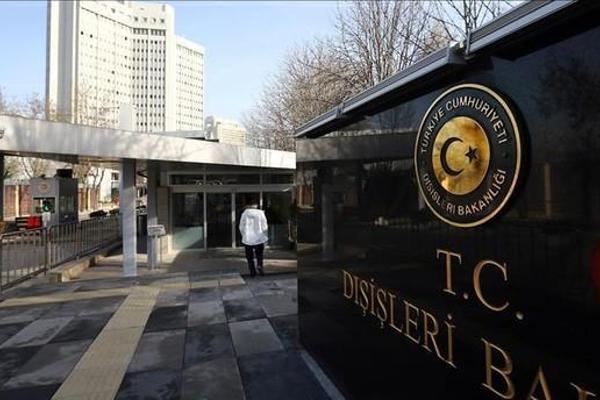Turkey rejects Trump’s description of 1915 events
ANKARA – Anadolu Agency


Turkey on April 25 rejected United States President Donald Trump’s “inaccurate expressions and the subjective interpretation of history” regarding the 1915 events, according to a statement by the Foreign Ministry.
President Donald Trump issued an annual commemoration of the 1915 events using the Armenian term “Meds Yeghern” (“Great calamity” in Armenian) in a statement on April 24.
“We reject the inaccurate expressions and the subjective interpretation of history in the written statement by Mr. Donald Trump, President of the U.S.A., released on 24 April 2018 regarding the events of 1915,” the statement said.
The statement said Turkey’s expectation from the U.S. administration was a “fair assessment of a period during which all the peoples of the Ottoman Empire suffered tremendously.”
The Foreign Ministry reminded President Trump that “during the same period more than 500,000 Muslims were slaughtered as a result of the events in which Armenian insurgents took part.”
It added that Turkey continues to offer the establishment of a Joint Historical Commission “in order to shed light on this painful period of history and has opened its archives to researchers.”
The statement said Ottoman Armenians who lost their lives during World War I were commemorated on April 24 in a ceremony held at the Armenian Patriarchate of Istanbul “suiting the respect they deserve and befitting the 800-year long friendship between Turks and Armenians.”
It also recommended that the U.S. administration considers the message of Turkish President Recep Tayyip Erdoğan to the Armenian Church in Istanbul during the commemoration ceremony “addressing the descendants of Ottoman Armenians, which reflects Turkey’s approach to this sensitive issue.”
The Turkish president offered condolences to the families of Ottoman Armenians who lost their lives during the 1915 events. He also offered condolences to the Turkish nation over the loss of millions of Ottoman citizens’ lives due to wars, migrations, conflicts, and diseases during the same period.
“Besides all these points, we think it is in line with common sense that the statement made by the U.S. president remained within international legal norms and did not refer to baseless genocide allegations,” it added. Turkey’s position is that the deaths of Armenians in eastern Anatolia in 1915 took place when some sided with invading Russians and revolted against Ottoman forces. A subsequent relocation of Armenians resulted in numerous casualties.
Ankara does not accept the alleged genocide, but acknowledges that there were casualties on both sides during the events of World War I.
Turkey objects to the presentation of the incidents as “genocide,” but describes the 1915 events as a tragedy for both sides.
Ankara has repeatedly proposed the creation of a joint commission of historians from Turkey and Armenia plus international experts to tackle the issue.
